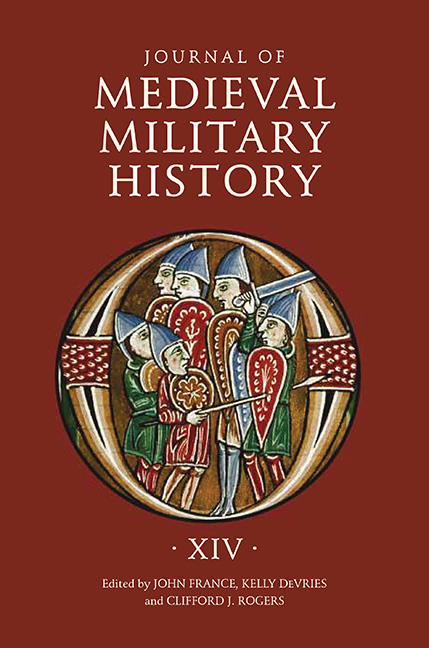Book contents
- Frontmatter
- Contents
- 1 Anglo-Norman Artillery in Narrative Histories, from the Reign of William I to the Minority of Henry III
- 2 Imperial Policy and Military Practice in the Plantagenet Dominions, c. 1337–c. 1453
- 3 The Parliament of the Crown of Aragon as Military Financier in the War of the Two Pedros
- 4 Chasing the Chimera in Spain: Edmund of Langley in Iberia, 1381/82
- 5 Note: A Medieval City under Threat Turns Its Coat, while Hedging Its Bets – Burgos Faces an Invasion in Spring 1366: Introduction and Translation
- 6 Medieval European Mercenaries in North Africa: The Value of Difference
- 7 Medieval Irregular Warfare, c. 1000–1300
- 8 Muslim Responses to Western Intervention: A Comparative Study of the Crusades and Post-2003 Iraq
- 9 “New Wars” and Medieval Warfare: Some Terminological Considerations
- 10 Friend or Foe? The Catalan Company as Proxy Actors in the Aegean and Asia Minor Vacuum
- List of Contributors
- Journal of Medieval Military History
- De Re Militari and the Journal of Medieval Military History
9 - “New Wars” and Medieval Warfare: Some Terminological Considerations
Published online by Cambridge University Press: 12 September 2017
- Frontmatter
- Contents
- 1 Anglo-Norman Artillery in Narrative Histories, from the Reign of William I to the Minority of Henry III
- 2 Imperial Policy and Military Practice in the Plantagenet Dominions, c. 1337–c. 1453
- 3 The Parliament of the Crown of Aragon as Military Financier in the War of the Two Pedros
- 4 Chasing the Chimera in Spain: Edmund of Langley in Iberia, 1381/82
- 5 Note: A Medieval City under Threat Turns Its Coat, while Hedging Its Bets – Burgos Faces an Invasion in Spring 1366: Introduction and Translation
- 6 Medieval European Mercenaries in North Africa: The Value of Difference
- 7 Medieval Irregular Warfare, c. 1000–1300
- 8 Muslim Responses to Western Intervention: A Comparative Study of the Crusades and Post-2003 Iraq
- 9 “New Wars” and Medieval Warfare: Some Terminological Considerations
- 10 Friend or Foe? The Catalan Company as Proxy Actors in the Aegean and Asia Minor Vacuum
- List of Contributors
- Journal of Medieval Military History
- De Re Militari and the Journal of Medieval Military History
Summary
Academics and policy makers concerned with the shifting nature of conflicts in the post-modern era have coined the term “new war” as a way of conceptualizing the move away from regular armed forces involved in conventional warfare to the more or less openly sponsored and overtly condoned use of “irregular” thirdparty actors, including professional mercenaries, warlords, criminal gangs and ideologically motivated volunteer fighters, a shift that seems to have gone hand in hand with a general loss of restraint on how warfare is conducted that has resulted in an increase of atrocities committed against non-combatants and cultural objects, which are frequently described as “medieval.” Apart from being dominated by a variety of different fighting groups alongside (and often independent from) the regular army, these “new wars” also generate new and decentralized war economies which, according to Mary Kaldor, “are heavily dependent on external resources and customarily rely on revenue generation by criminal means through blackmail, extortion, plundering and the illegal traffic in arms, drugs and humans, all of which are sustained through continued violence.” As a result, the “distinction between war (usually defined as violence between states or organized political groups for political motives), organized crime (violence undertaken by privately organized groups for private purposes, usually financial gain) and large-scale violations of human rights (violence undertaken by states or politically organized groups against individuals)” has become increasingly blurred.3 In all of this the “new wars” distinguish themselves from the state-centered, high-intensity “old wars,” which were fought by armies consisting of “vertically organized hierarchical units” and fueled by “centralized, totalizing and autarchic” economies.
How “new” these “new wars” are has now become a matter of some debate. Mary Kaldor, in the third edition of her influential New and Old Wars. Organized Violence in a Global Era, argues that as a new type of organized violence “new wars” developed in Africa and Eastern Europe during the last decades of the twentieth century, but she also acknowledges that “many of the critics point out, rightly, that the wars of the early modern period were similar to ‘new wars’ before states became as strong as they are today.”
- Type
- Chapter
- Information
- Journal of Medieval Military HistoryVolume XIV, pp. 149 - 162Publisher: Boydell & BrewerPrint publication year: 2016



